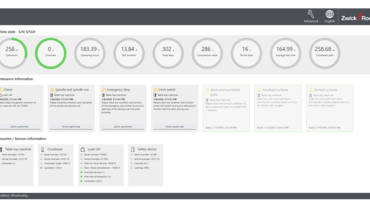Efficiency Checklist: Consider the High Automation Potential for Your Testing Lab!
The golden rule of every testing lab is to determine reliable material characteristics, while eliminating the many possible influences both from the operator as well as the testing machine itself. In addition, quality control is increasingly becoming subject to cost pressures. To implement this process with efficiency, different possibilities are available for use in the materials testing lab. Below, we present various points that can help you attain reliable test results while maintaining economically supported testing processes.
1. Standardization of workflows:
Performance of the mechanical tests is throughly described in the corresponding industry standards. The processes that precede the test (including specimen preparation, management of the specimen data, etc.) as well as those that follow the test (evaluation, storage, etc.) are the responsibility of the individual companies. Develop clearly laid out, well documented processes and make sure that every employee knows these processes and adheres to them. It is also important to standardize these procedures from a general perspective, because they will serve as the foundation for future automation of your testing processes.
2. Automation of processes:
Identify manual tasks that can potentially be automated, and implement the respective technologies to save time and resources. Perfectly predestined for automation is, for example, the input of specimen dimensions into the existing testing software, such as through a micrometer that directly transfers the data to the testing software. In addition, there is tremendous potential for transferring test data automatically into the QA system, rather than entering it manually.
3. Optimization of the specimen machining process:
Make sure that specimen machining is efficient, thereby minimizing delays and reducing errors. Especially for metals, plastics and elastomers, there are appropriate instruments and machines that simplify machining of specimens (such as specimen blanking machines) and improve the homogeneity of these specimens through corresponding post-processing (e.g., specimen grinding), ultimately minimizing scatter in your test results.

4. Regular calibration and maintenance:
Schedule regular maintenance to ensure that your instruments are functioning properly and delivering accurate results. On the one hand, consistent maintenance helps reduce or even eliminate downtimes. On the other, calibration ensures that the “machine factor” has no influence on the test result. In the meantime, you also have access to daily check devices that allow you to check the machine on a daily basis for early detection of any deviations.

5. Employee training:
Offer training and professional development opportunities to ensure that your employees have the necessary knowledge base and capabilities to efficiently carry out their responsibilities. Today, there are many testing software programs, including testXpert, which are highly intuitive and do not require extensive training efforts. However, especially for less-skilled personnel, basic training and/or standard/application training is useful to promote an understanding of material characteristics and avoid operational errors.
6. Effective communication:
Promote open communication among your personnel. This helps prevent misunderstandings and improves employee collaboration. Regular team meetings, clear communication channels and a transparent flow of information ensure that your employees are always on the same level and can work together efficiently.
7. Verification of quality assurance processes / continuous improvement:
Regularly monitor your quality assurance processes to ensure that they are effective and adhere to corresponding requirements. Implement a system for continuous improvement and efficiency increase in the lab. Gather feedback to identify problems and determine solutions in a timely manner. Through the availability of comprehensive measurement and machine data, testXpert Analytics provides the ideal foundation for the evaluation of your processes and initiation of improvements.

